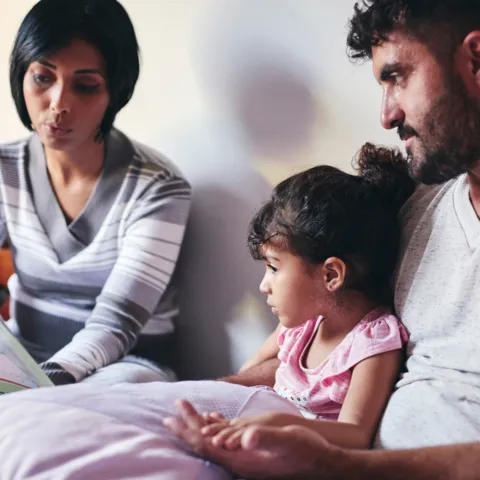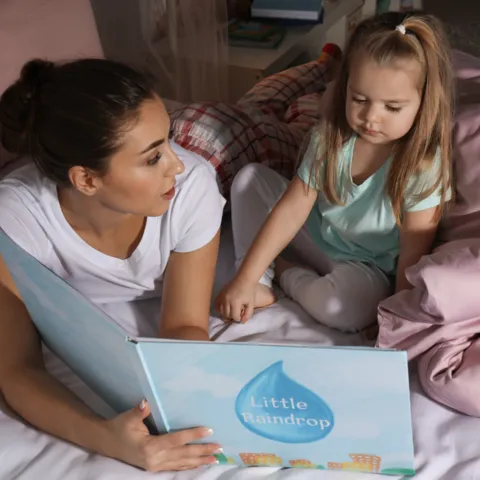Kids with anxiety often suffer from nightmares and can have a hard time falling asleep because their minds are focused on their worries.
6 Ideas to Reduce Nighttime Anxiety for Your Child
Helping to your child have a better sleep
We all know the power of a good night's sleep. The impact of a bad sleep can negatively affect our cognitive abilities and weaken our immune system. But for children with anxiety, getting a good night's sleep can be especially hard.
While it can seem like there's not a lot for your child to worry about, kids ages 5 and up are still navigating new situations, learning social development skills and finding their place of belonging, whether that is at school, in organized sports or even at home.
Tips for Reducing Bedtime Anxiety in Children
Now I am sure you know, having a nighttime routine is helpful at any age, but is especially critical for developing young minds. But having a routine doesn't guarantee a good night's sleep. If your child is a worrier, nighttime can be a time that those worries really come to life. Being afraid of the dark, being afraid of being alone, and being left alone with one's thoughts can all be problematic for an anxious child. It can become a vicious cycle where your child doesn't want to go to bed because they are afraid of nightmares or the dark, but then not having a good night's sleep can negatively impact their thinking and mood, and so it goes on and on. You and your child might battle about what time bedtime should be, creating additional conflict that stresses both you and your child. This can be a lot for the whole family to navigate.
Focusing On Connection & Positive Thinking
One of the best ways to ease into a nighttime routine is to do something that your child will enjoy. It could be a nightly backrub, snuggle, and/or story time. Picking books that are positive and allow your child to reflect on the good things of the day can help put them into a healthy headspace. Focusing on a gratitude practice or positive affirmations is another way to help your child prepare for a restful night's sleep. Taking the time to make bedtime a bonding time focused on connection will help them feel safe and secure. It does mean more time but putting in that effort but the payoff can be huge for the whole family.
Teaching your Child Self-Regulating Tools
Teaching your child tools that can help them self-regulate and navigate those worries can be very helpful. One tool is teaching your child how to identify the thought they are having, the feeling associated with that thought, asking if that thought is true, and challenging them to see if they can come up with another, more helpful thought. This principle is based off the concept of cognitive behavioural therapy which focuses on helping people rethink a thought they are having.
Make Yoga Part of Your Nighttime Routine
Yoga can be a great way to help calm the mind, reduce stimulation, and help your child relax. Teaching your child mindfulness practices can help benefit them now and can be a habit that promotes a healthy mind well into adulthood. Incorporate breathwork as part of the routine to help regulate the nervous system. Learn a breathing exercise designed for kids here.
Reduce Screen Time & Limit Content That's Not Age Appropriate
Kids can be sensitive to the content they are exposed to. For example, if the nightly news is on every night, your child may experience anxiety about current events, COVID-19 or world politics. Children can carry a lot of worry if they are exposed to content that isn't suitable for their age. Consider reading the news or listening with headphones and then find time to have age-appropriate conversations about larger topics like the pandemic, wars, or natural disasters. It's not about ignoring these events that are happening, since kids will hear about them, it's about limiting the exposure (especially graphic images) and finding the right messaging that is age appropriate.
Create a Family Bedtime Plan Together
Empower your child to be a part of the planning for bedtime. Find fun ways to make it easier for your child to adapt to it. You can use visuals to provide cues that it's coming up to bedtime and remind them of the parts they will enjoy (story time, gratitude practice).
Incorporate Their Senses
Part of being mindful is being connected to our bodies. Having routines that connect with their senses can be helpful. For example, a dedicated stuffed animal that smells like lavender can be a soothing cue for nighttime. For many kids having a soft blanket, maybe even one from when they were a baby, can instantly soothe them. A hot water bottle can also help. Whatever the choice, it can always be helpful to have a consistent soothing item that your child associates with bedtime




